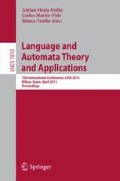Abstract
Mix-automatic sequences form a proper extension of the class of automatic sequences, and arise from a generalization of finite state automata where the input alphabet is state-dependent. In this paper we compare the class of mix-automatic sequences with the class of morphic sequences. For every polynomial ϕ we construct a mix-automatic sequence whose subword complexity exceeds ϕ. This stands in contrast to automatic and morphic sequences which are known to have at most quadratic subword complexity. We then adapt the notion of k-kernels to obtain a characterization of mix-automatic sequences, and employ this notion to construct morphic sequences that are not mix-automatic.
Access this chapter
Tax calculation will be finalised at checkout
Purchases are for personal use only
Preview
Unable to display preview. Download preview PDF.
References
Allouche, J.P., Shallit, J.: Automatic Sequences: Theory, Applications, Generalizations. Cambridge University Press, New York (2003)
Berstel, J.: Transductions and Context-Free Languages. Teubner (1979)
Cobham, A.: On the Base-Dependence of Sets of Numbers Recognizable by Finite Automata. Mathematical Systems Theory 3(2), 186–192 (1969)
Cobham, A.: Uniform Tag Sequences. Theory of Computing Systems 6, 164–192 (1972)
Ehrenfeucht, A., Lee, K.P., Rozenberg, G.: Subword Complexity of Various Classes of Deterministic Languages without Interaction. Theoretical Computer Science 1, 59–75 (1975)
Grabmayer, C., Endrullis, J., Hendriks, D., Klop, J.W., Moss, L.S.: Automatic Sequences and Zip-Specifications. In: Proc. Symp. on Logic in Computer Science (LICS 2012), pp. 335–344. IEEE Computer Society (2012)
Grabmayer, C., Endrullis, J., Hendriks, D., Klop, J.W., Moss, L.S.: Automatic Sequences and Zip-Specifications. Tech. Rep. 1201.3251, arXiv (2012), http://arxiv.org/abs/1201.3251v1
Knuth, D.E.: The Art of Computer Programming, vol. II: Seminumerical Algorithms, 2nd edn. Addison-Wesley (1981)
Morse, M., Hedlund, G.A.: Symbolic Dynamics. American Journal of Mathematics 60, 815–866 (1938)
Rigo, M.: Generalization of Automatic Sequences for Numeration Systems on a Regular Language. Theoretical Computer Science 244(1-2), 271–281 (2000)
Rigo, M., Maes, A.: More on Generalized Automatic Sequences. Journal of Automata, Languages and Combinatorics 7(3), 351–376 (2002)
Author information
Authors and Affiliations
Editor information
Editors and Affiliations
Rights and permissions
Copyright information
© 2013 Springer-Verlag Berlin Heidelberg
About this paper
Cite this paper
Endrullis, J., Grabmayer, C., Hendriks, D. (2013). Mix-Automatic Sequences. In: Dediu, AH., Martín-Vide, C., Truthe, B. (eds) Language and Automata Theory and Applications. LATA 2013. Lecture Notes in Computer Science, vol 7810. Springer, Berlin, Heidelberg. https://doi.org/10.1007/978-3-642-37064-9_24
Download citation
DOI: https://doi.org/10.1007/978-3-642-37064-9_24
Publisher Name: Springer, Berlin, Heidelberg
Print ISBN: 978-3-642-37063-2
Online ISBN: 978-3-642-37064-9
eBook Packages: Computer ScienceComputer Science (R0)

